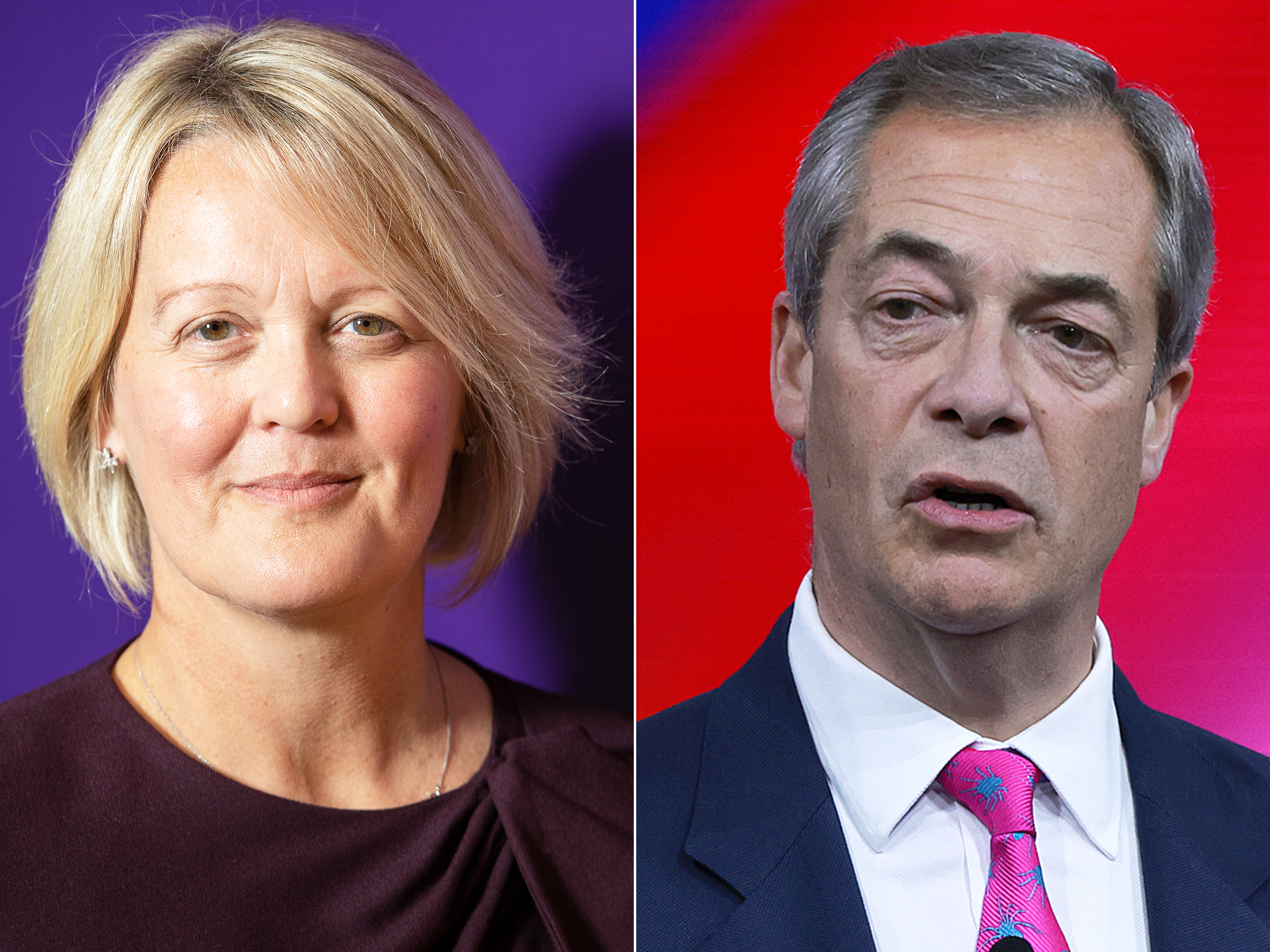Everyone lost in the Coutts bank scandal... except Nigel Farage
One moment Alison Rose was being hailed as Britain’s leading female executive, the next she had quit her job as Natwest chief amid a row involving Coutts bank and the ex-Ukip leader. Chris Blackhurst looks back on the biggest business story of the last year


My editor loves setting challenges. He’s asked for one standout City story of the year, a tale that defines 2023.
Well, in 12 months devoid of spectacular deals, with a sluggish market and an economy that at best was flat, it’s not easy. There were few OMG moments, no epic fraud trials (not in the UK anyway) that were ground-shaking.
But there was one episode that had everything. It was a veritable Christmas pudding of an affair, containing every ingredient possible.
This was the defenestration of Dame Alison Rose. There she was, credited with doing a great job running NatWest, hailed as an excellent banker and held up as Britain’s foremost female senior executive. Then, in rapid time, she was gone. Not only that but Rose was also stripped of £7.6m due to her share awards and bonuses.
To recap, a terrible fuss, orchestrated by Nigel Farage, ensued when the Brexit campaigner turned chat show host, had his account at Coutts, the private bank owned by NatWest, closed. He was offered banking at NatWest instead.
A furious Farage said he was being persecuted for his political views, that he’d been refused accounts at seven other UK banks.
With Farage on the warpath, Alison Rose, CEO of NatWest, attended a charity dinner and sat next to Simon Jack, the business editor for BBC News. The following day Jack published an article saying Coutts had ditched Farage for commercial reasons.
At that stage there had been no formal confirmation of Coutts’ involvement. Everybody thought Coutts was the bank in question – it is Britain’s leading private bank and whenever a private bank is mentioned, Coutts is the first one that springs to mind. There had been repeated references to the bank being Coutts, none of them denied.
Rose, believing Coutts’s identity was in the public domain, referred Jack to the bank’s published criteria for shutting accounts. That’s all she did.
Farage, his sympathisers, the media, went into overdrive. Rose had mingled with senior BBC journalists and fellow corporate bosses at an exclusive, candle-lit banquet, and over fine wine dished the dirt on the populist rabble-rouser. This was the snooty metropolitan elite at its worst.
As it happened, Rose did not even know why Farage’s account had gone. It did not matter, since Rose, mindful of the rules, was extremely careful in what she said. But she did name Coutts.
Probably, if it had been a different bank, the story would have ended there. But Coutts was part of a group that had been rescued by the taxpayer in the crisis of 2008. The government was a major shareholder.
No one stirs up the Tories more than Farage. Rishi Sunak lives in permanent fear of the doyen of the rebellious right-wing, the Brexiteers and friend of Donald Trump. He is anxious that at any moment Farage will launch another broadside at his government or some sort of putsch.
The Tories want Farage inside the tent, backing them, come the next election. That was evident at this year’s party conference when a visiting Farage was welcomed and greeted by some senior figures as a returning friend.
There you are, you’re Sunak and Jeremy Hunt, the chancellor, and Farage is accusing you of using your bank to besmirch his character and reputation and to deny him the ability, the right, to bank.
At first, the NatWest board, headed by the City grandee Sir Howard Davies, says it is backing Rose. Then, within hours, following a call from the Treasury saying the government, the major shareholder, had lost confidence in her, she is dropped. Just like that.
No matter that Rose had apologised for making an honest mistake or that she had not discussed in any detail Farage’s confidential affairs and that since her appointment in 2019 she had excelled and NatWest would be left with a large hole to fill.
No one though wants to listen. Ever since 2008, when the greed of a few almost brought down the world economy, resulting in government bailouts and austerity measures in the UK, they have been public enemy number one.
In 2008, it was spineless politicians who did not move against them and did not seek convictions. Ever since, ironically, political leaders have wanted to be seen to act tough where banks are concerned, conscious they let the public down.
They do so, knowing that the politics of envy means the press and public will be right behind them. By most people’s standards, bankers earn extraordinary amounts and pursue luxurious lifestyles. Tellingly, Rose’s house duly featured in the press.
No one is a greater master at highlighting this divide, playing the little man and standing up for ordinary folk against the wealthy and powerful than Farage.
Davies could have refused to follow the Treasury’s wish, but then he, too, would have been pilloried. That would not be Davies’ preferred ending to a career punctuated by heavyweight appointments.
And Rose, let us not forget, had transgressed, she was open about that. To make matters worse, Farage served a SAR request that showed Coutts had prepared a report on his scrutinised beliefs and behaviour, and that was also a factor in his going.
As I say, it had everything, including that time-honoured get out of any hounded institution of a specially commissioned review from a firm of City solicitors.
There was one loser and it was not Farage. He ended the year reportedly £1.5m richer, thanks to guzzling animal penises in I’m a Celebrity… Get Me Out of Here. Would he have been chosen without the row with Coutts? Possibly, but the controversy certainly helped.
No, the loser was Rose. Arguably, there was another: British banking was much the poorer for her departure. And another: the taxpayer, holder of shares in the bank she ran. In fact, everyone lost – everyone that is, except Nigel Farage.
Join our commenting forum
Join thought-provoking conversations, follow other Independent readers and see their replies
Comments
Bookmark popover
Removed from bookmarks